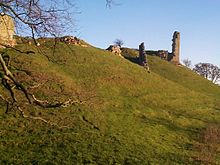Richard de Umfraville
Richard de Umfraville (also Umfreville ) († 1226 ) was an English nobleman.
origin
Richard de Umfraville came from the Anglo-Scottish Umfraville family . He was a younger son of Odinel II de Umfraville and his wife Alice de Lucy. After the death of his older brother Robert , who probably died unmarried before the end of September 1195, he inherited the extensive estates of the family in Northumberland , including Prudhoe Castle , as well as other estates in Yorkshire , Rutland and Suffolk .
Life
As his brother's successor, Umfraville had to pay the handsome fee of £ 100 to King Richard I of England . This sum included both the fee for his inheritance, but also a fine because Umfraville had not fought for the king in Normandy . Umfraville's main interests, like his father Odinel, were mainly in his northern English estates. In a trial against Eustace de Vesci , Lord of Alnwick, he was able to successfully sue for a lucrative guardianship administration of a dominion in Northumberland. Nonetheless, he became a political ally of Vesci when Vesci became one of the leaders in the resistance against the tyrannical rule of King John Ohneland . Like many other northern English barons, Umfraville suffered from the king's increasing demands for money. Between 1201 and 1205 he had to pay at least 210 marks in shield money to the king, and in 1205 he had to pay a further 100 marks when he inherited part of his mother’s land after the death of Godfrey de Lucy , his mother’s brother. Even before the First Barons' War, King Johann Umfraville suspected that he might rebel against him. Therefore, Umfraville had to hand over Prudhoe Castle to the king on August 24, 1212 and place his four sons hostage. In the late spring of 1213, Umfraville was still a member of the army that the king had called out to ward off a feared French invasion of southern England. In May 1215, Umfraville joined the rebels who finally forced the king to recognize the Magna Carta . During the First Barons' War, Umfraville continued to belong to the rebels, which is why Johann gave his lands to the loyal Hugh de Balliol . After the War of the Barons had ended by the Peace of Lambeth in 1217, Umfraville submitted to the Regency Council before October 26, 1217, which was responsible for the new, minor King Henry III. led the government. Before November 3, 1217, he received Prudhoe Castle back. As a result, however , there was a protracted and bitter dispute between Umfraville and Philip of Oldcoates , who had fought on the king's side during the Civil War. In July 1218, Umfraville accused Oldcoates of having built a castle to the detriment of Prudhoe near Nafferton . Oldcoates, on the other hand, accused Umfraville of having expanded his other castle, Harbottle Castle , contrary to the government's ban . On July 15, 1220, the Umfraville government ordered the expansion to be reversed. Umfraville then turned to the Justiciar Hubert de Burgh and explained that Harbottle was of great importance for the defense of northern England against Scottish attacks. Ultimately, the order to grind Harbottle was reversed. In his final years, Umfraville was a loyal vassal of the government who participated in the 1224 siege of rebel-held Bedford Castle .
Foundations and Legacies
Umfraville donated the village and church of Thockrington to the Archdiocese of York , with whom he had previously fought fiercely over the rule of Hexham . To do this, he made foundations in favor of Hexham Abbey and Newminster . The name of his wife, with whom he had at least four sons and two daughters, is unknown. His heir became his eldest son Gilbert de Umfraville .
Web links
- Henry Summerson: Richard de Umfraville (d. 1226). In: Henry Colin Gray Matthew, Brian Harrison (Eds.): Oxford Dictionary of National Biography , from the earliest times to the year 2000 (ODNB). Oxford University Press, Oxford 2004, ISBN 0-19-861411-X , ( oxforddnb.com license required ), as of 2004
- Richard de Umfreville on thepeerage.com , accessed March 8, 2017.
| personal data | |
|---|---|
| SURNAME | Richard de Umfraville |
| ALTERNATIVE NAMES | Richard de Umfreville |
| BRIEF DESCRIPTION | English nobleman |
| DATE OF BIRTH | 12th Century |
| DATE OF DEATH | 1226 |
